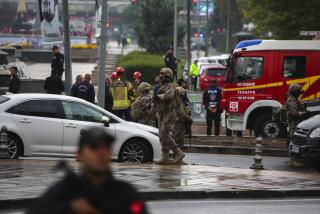Croatian City Shelled; 10 Die in Violence
- Share via
BELGRADE, Yugoslavia — Mortar fire rained down on a major Croatian city Tuesday and other clashes broke out in the rebellious republic, shattering a fragile truce as Yugoslav leaders resumed talks on the country’s future.
At least 10 people were reported killed in Tuesday’s violence after a weekend of bloody fighting in which 42 people died.
An official at Croatia’s Interior Ministry said the center of Osijek--the provincial capital of the strife-torn Slavonia region--came under heavy mortar bombardment and gunfire overnight.
The city’s cathedral, post office, apartment blocks and stores were hit when shelling began at midnight, apparently from a nearby federal army training base, said the official, who requested anonymity.
One woman in a makeshift refugee center in Osijek was killed by a stray bullet, and a child in an apartment also died, the official said. A streetcar carrying morning commuters was hit by a mortar round, killing two passengers and wounding five.
Three Croatian guardsmen were killed early Tuesday in separate incidents near Topusko, 30 miles south of Zagreb, Croatian radio reported. It gave no further details.
The attack on Osijek, where Serbs make up only about a quarter of the population, provoked an enraged protest by the Croatian government, which has conceded that it is losing a territorial war to the Serbs.
Milan Ramljak, a Croatian vice president, described the attack as “the most brutal and coordinated action” by the federal army and armed Serbs. He called it “a crime against civilians.”
Vladimir Seks, head of Osijek’s crisis command, said the army shelled Osijek in a coordinated move with Serb militants, who simultaneously attacked the city’s suburbs.
The federal presidency and the presidents of Yugoslavia’s six republics met in Belgrade Tuesday, marking a return to negotiations on a new framework for the country, interrupted by June 25 declarations of independence by Croatia and Slovenia.
Ramljak said it was “no accident” that the attack on Osijek took place as the leaders were meeting in Belgrade. He apparently meant that the Serbs were trying to sabotage the negotiations.
The state news agency Tanjug said the meeting, headed by Croatia’s Stipe Mesic, would focus on “finding a solution to the future relations within the Yugoslav community.”
The meeting--the first such gathering since Croatian President Franjo Tudjman stormed out of a similar session in late July--was clouded by the continuing violence in Croatia and fears that events in the Soviet Union might inspire Communist hard-liners here.
Despite a truce called Aug. 7 by the presidency, heavy fighting resumed over the weekend between Croatian security forces and armed Serb militias.
Croatia accuses the army of siding with the Serbs. Federal generals say their troops are in Croatia to separate the warring parties.
The attack on downtown Osijek--a stronghold of Croatian nationalism with some 130,000 inhabitants--was the first on a major Croatian town center. Inhabitants of Zagreb have been worried by persistent rumors of an attack on the capital.
The bombardment looked certain to lessen already slim chances could be reached to end ethnic violence that has killed more than 250 in the breakaway republics since June 25.
Mortar shells also rained on the Slavonian towns Vinkovci and Vukovar, the Croatian official said. Tanjug said three people were wounded in the 45-minute bombardment of Vinkovci.
Like the Soviet Union, Yugoslavia is faced with regional leaders challenging the authority of a crumbling Communist federation.
Communist hardliners ousted Soviet President Mikhail S. Gorbachev Monday and declared a state of emergency.
Some Croatian and Slovenian leaders fear that might prompt similar moves in Yugoslavia.
“There is a real danger that a similar scenario is planned in Yugoslavia in coordination with those who carried the coup in the Soviet Union,” said Ante Babic, an adviser to Croatia’s President Franjo Tudjman.
More to Read
Sign up for Essential California
The most important California stories and recommendations in your inbox every morning.
You may occasionally receive promotional content from the Los Angeles Times.













